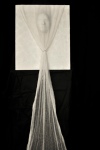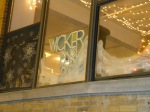A random Sunday in October of 2006. I sat at one of my usual haunts, the quirky little brick-and-wood spot addressed at 1741 North Western Avenue in Chicago’s Bucktown neighborhood, wondering where the hell World Can’t Wait had trotted off to this time. It was the second time this had happened – I had been given one address by the political group and told they were meeting there that Sunday, and they went someplace else without me.
So I was sitting there, nothing to do, not willing to make the return trip home because I had just dragged myself a half-mile while getting licked by the bitter winds. My health was already getting under the weather. Fortunately, no one seemed in any hurry to shove me out the door. The first person I saw was Nanette; now, I knew Nanette strictly nominally as the friendly hipster artist who was also the acting barista at the Monday jazz shows that flowed into the World Can’t Wait room’s thin walls. I thought I had a fairly accurate read on her through our brief drink and pastry exchanges then. She clearly had to be one of the many people in the building connected with the Near Northwest Arts Council. Had to be. Had that vibe.
“Would you like a cup of tea?” she asked me that day.
“Sure,” I said. I didn’t think I was in any condition to turn down an offer of tea.
Nanette brought me the tea and, as she turned to leave, casually added “Oh, we’re having a prayer service at 5. You’re welcome to come if you like.” I could swear it was an afterthought.
Whatever, though. I wasn’t planning to head out anytime soon, and I had nothing better to do. A prayer service might be good for a few yuks, at any rate. Why the hell not?
Well… My life was changed for good after I left. I couldn’t describe what about the service hit me at the time, and I still can’t. I walked into the service room flying high on some 18 months of declared, anti-religious atheism after getting pissed with two different dogmas. I thought I was done. Instead, that Sunday invitation turned out to be the beginning of a whole different path which I’ve been walking ever since. It was my welcome to a unique spiritual community called Wicker Park Grace, and it quickly became one of my life’s centerpieces. My involvement there made me a better person in a few ways, some of which I’m certain I don’t know about yet.
Anyway, of all the qualities I attached to Nanette the way I saw her then, Presbyterian Minister was among the last on my list. I figured the initial prayer service I attended was some kind of novelty thing; not a weekly meeting. Nanette, though, said she ran services like that every week, and when I returned the next week, Nanette, me, and a handful of other people sat down in a small room. You know what the service was? The small lot of us sitting down, eating dinner, and talking about the various questions and problems we all had about scriptures. I finally got to ask about all the problems I had with the two different religions I had followed in my life to that point, and had used to hammer fundamentalists afterward. It was the first time anyone ever took my questions and comments seriously. The congregation of Wicker Park Grace wasn’t there to crush opposition to religion by insisting that I just believe, or that I wasn’t reading something properly; the earliest form of the church that I knew there was just as confused, angry, and misfit as I was, and just as eager to get to the bottom of the scriptures they were familiar with.
Nanette never tried to stand pat with testimonies and reaffirmations of faith. In fact, she was the one leading us through some questions and into even more questions. For a working class kid raised in a staunch literalist religious atmosphere, this was unheard of, and it was because of this that Nanette managed to do something no other Minister I ever met had managed: She got through to me. She made me think. She challenged everything I thought I knew about religion previously, through both my experience following two different faiths and then turning my back on them both.
The new way I discovered of looking at religion had a remarkable and unexpected effect: It made me appreciate the positive aspects of the religion I was raised practicing again while managing to reinforce my atheism at the same time. I wasn’t the only person at Wicker Park Grace who started to wonder if there could ever be such a beast as a Christian Atheist. Christian Atheism or not, though, all the barriers that mentally kept me from questioning in the past finally broke down, and I began to appreciate the fact that I could be a perfectly flawed human being and still be a halfway decent person.
I had had several Ministers in my past, but Nanette is the one I consider my first real Minister. She managed to find a new life for my weather-worn soul and prevent a third form of unofficial religious dogma from taking hold of it. I learned that I liked asking questions about the big issues of religious faith and upsetting the natural order, and Nanette gave me the first real outlet I had to do that.
Wicker Park Grace grew and eventually moved to a different building, establishing a new form as Grace Commons. But people have this funny way of moving on, and Nanette was eventually installed as the Minister of a whole new congregation. Grace Commons moved yet again soon afterward, its members moved into areas of Chicago more difficult to reach – and sometimes out of Chicago altogether – and everything that Grace Commons established started falling apart. The last time I managed to get to Grace Commons, services had become bi-weekly affairs with attendance on par with the first services I ever attended there. A couple of my friends there remarked to me last year they weren’t sure of Nanette’s ability to be a full-time Minister to two congregations.
That turned out to be a good guess, because Nanette is stepping down, and Grace Commons is losing its talisman. As the Minister of Grace Commons, Nanette installed a core ethos of hospitality and welcomed everyone, regardless of their background, and was beloved for her easy, outgoing, and personable style of teaching. She oversaw Grace Commons as it turned from three people in a coffeehouse to a formalized establishment with a personality of its own. Without her, Grace Commons is taking a congregation-run course, and I can’t say I know what’s in store for it. But I think I can speak for all of the old regulars from Grace Commons when I say: Nanette, we love you.


